Medical and Healthcare Law: Confidentiality and its Circumstances
VerifiedAdded on 2023/01/20
|28
|9056
|29
Essay
AI Summary
This essay delves into the crucial topic of medical law, with a specific focus on patient confidentiality within the context of the doctor-patient relationship. The introduction establishes the ethical basis for confidentiality, highlighting its importance in fostering trust and securing public health. The essay then explores the evolution of patient privacy from a medical record property to a fundamental right, and it also addresses the circumstances under which breaching confidentiality might be justified, such as for the greater good, in emergencies, or when national security is at stake. The paper further examines the impact of confidentiality on the therapeutic relationship, discussing the ethical dilemmas healthcare professionals face and the legal frameworks that govern patient data, including the Data Protection Act 2018 and the Human Rights Act 1998. The essay also covers international guidelines such as the WHO's patient rights and the legal aspects of confidentiality in the UK. The work concludes by summarizing the ethical, legal, and practical aspects of maintaining patient confidentiality in medical practice, including the importance of informed consent and the consequences of breaches.
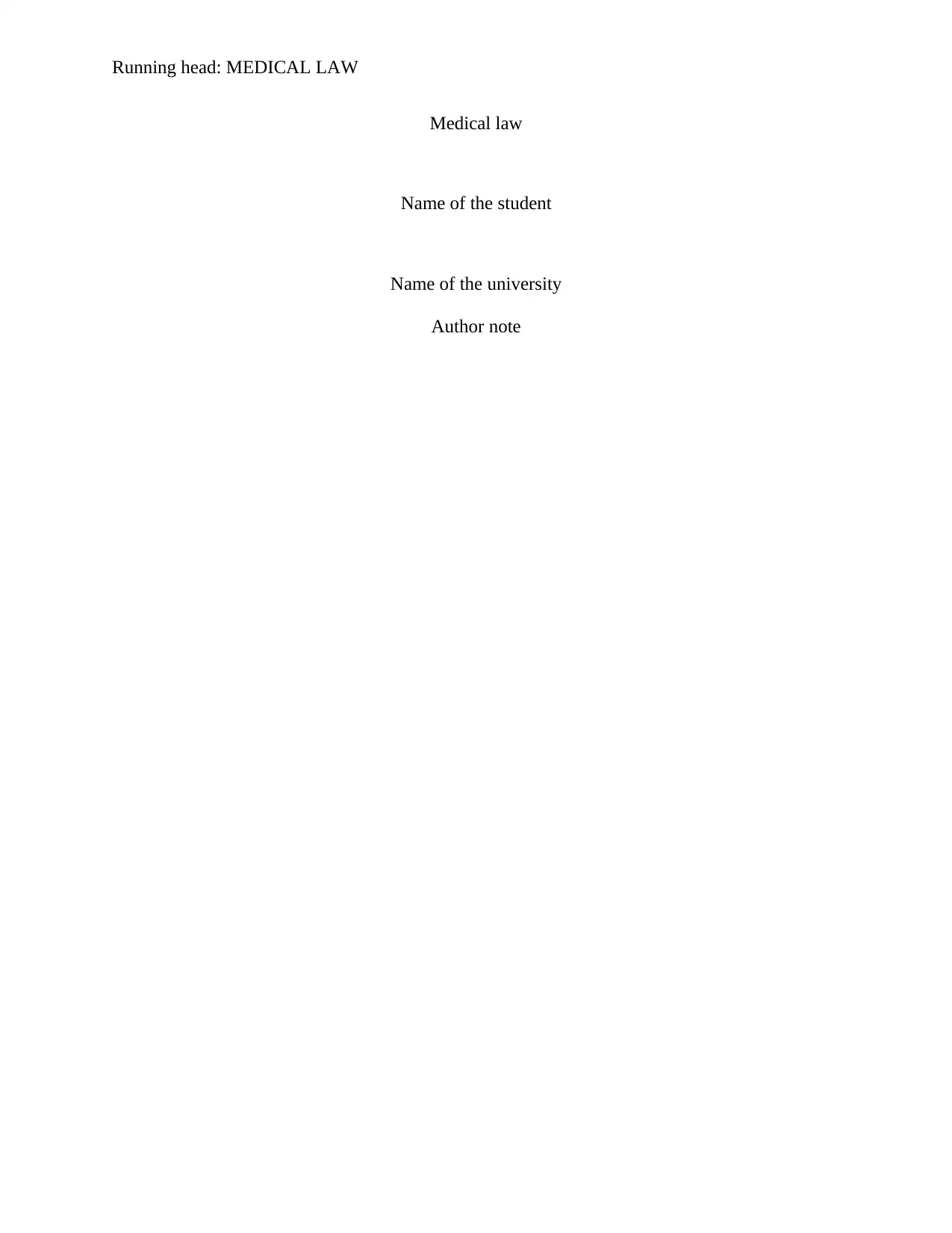
Running head: MEDICAL LAW
Medical law
Name of the student
Name of the university
Author note
Medical law
Name of the student
Name of the university
Author note
Paraphrase This Document
Need a fresh take? Get an instant paraphrase of this document with our AI Paraphraser
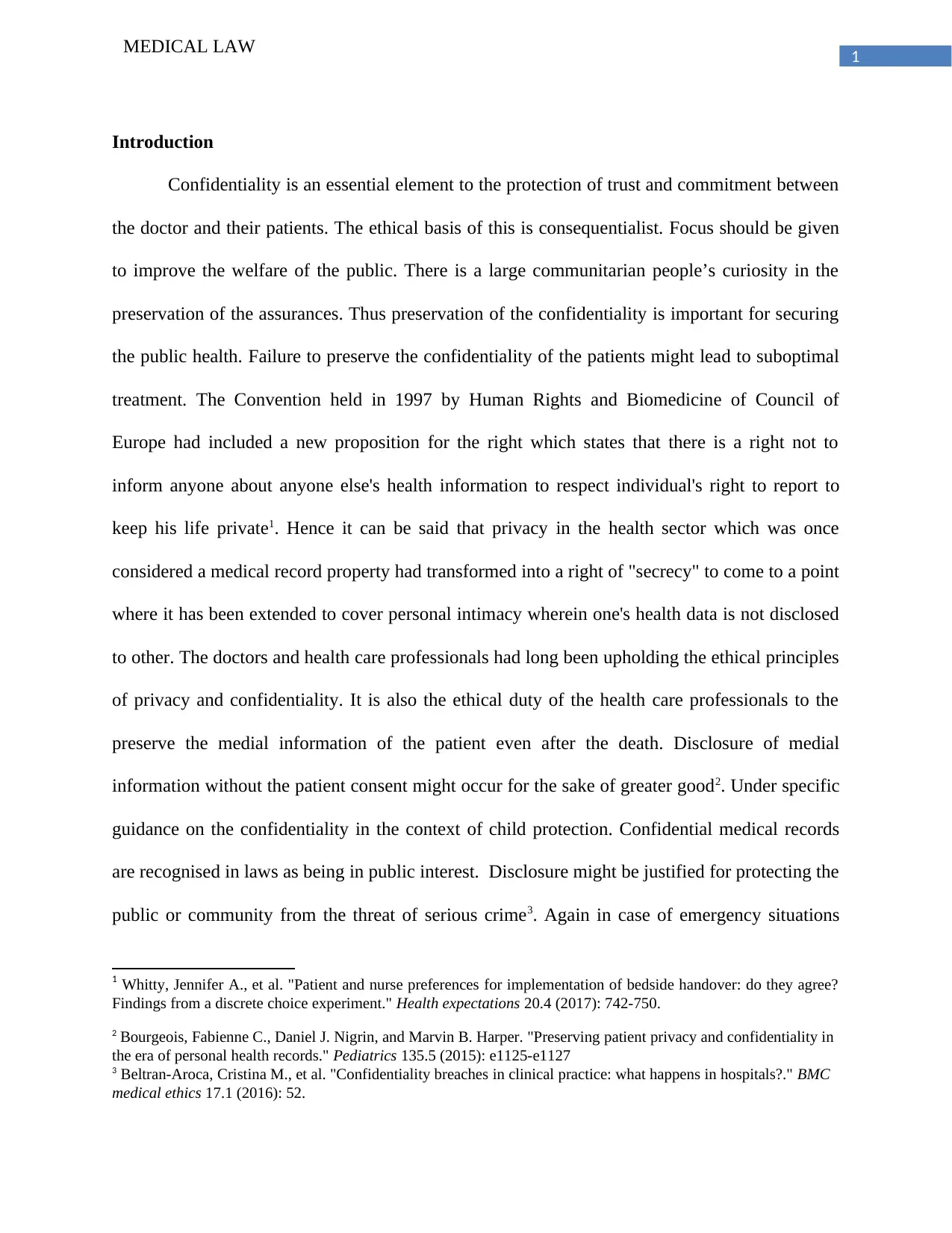
1
MEDICAL LAW
Introduction
Confidentiality is an essential element to the protection of trust and commitment between
the doctor and their patients. The ethical basis of this is consequentialist. Focus should be given
to improve the welfare of the public. There is a large communitarian people’s curiosity in the
preservation of the assurances. Thus preservation of the confidentiality is important for securing
the public health. Failure to preserve the confidentiality of the patients might lead to suboptimal
treatment. The Convention held in 1997 by Human Rights and Biomedicine of Council of
Europe had included a new proposition for the right which states that there is a right not to
inform anyone about anyone else's health information to respect individual's right to report to
keep his life private1. Hence it can be said that privacy in the health sector which was once
considered a medical record property had transformed into a right of "secrecy" to come to a point
where it has been extended to cover personal intimacy wherein one's health data is not disclosed
to other. The doctors and health care professionals had long been upholding the ethical principles
of privacy and confidentiality. It is also the ethical duty of the health care professionals to the
preserve the medial information of the patient even after the death. Disclosure of medial
information without the patient consent might occur for the sake of greater good2. Under specific
guidance on the confidentiality in the context of child protection. Confidential medical records
are recognised in laws as being in public interest. Disclosure might be justified for protecting the
public or community from the threat of serious crime3. Again in case of emergency situations
1 Whitty, Jennifer A., et al. "Patient and nurse preferences for implementation of bedside handover: do they agree?
Findings from a discrete choice experiment." Health expectations 20.4 (2017): 742-750.
2 Bourgeois, Fabienne C., Daniel J. Nigrin, and Marvin B. Harper. "Preserving patient privacy and confidentiality in
the era of personal health records." Pediatrics 135.5 (2015): e1125-e1127
3 Beltran-Aroca, Cristina M., et al. "Confidentiality breaches in clinical practice: what happens in hospitals?." BMC
medical ethics 17.1 (2016): 52.
MEDICAL LAW
Introduction
Confidentiality is an essential element to the protection of trust and commitment between
the doctor and their patients. The ethical basis of this is consequentialist. Focus should be given
to improve the welfare of the public. There is a large communitarian people’s curiosity in the
preservation of the assurances. Thus preservation of the confidentiality is important for securing
the public health. Failure to preserve the confidentiality of the patients might lead to suboptimal
treatment. The Convention held in 1997 by Human Rights and Biomedicine of Council of
Europe had included a new proposition for the right which states that there is a right not to
inform anyone about anyone else's health information to respect individual's right to report to
keep his life private1. Hence it can be said that privacy in the health sector which was once
considered a medical record property had transformed into a right of "secrecy" to come to a point
where it has been extended to cover personal intimacy wherein one's health data is not disclosed
to other. The doctors and health care professionals had long been upholding the ethical principles
of privacy and confidentiality. It is also the ethical duty of the health care professionals to the
preserve the medial information of the patient even after the death. Disclosure of medial
information without the patient consent might occur for the sake of greater good2. Under specific
guidance on the confidentiality in the context of child protection. Confidential medical records
are recognised in laws as being in public interest. Disclosure might be justified for protecting the
public or community from the threat of serious crime3. Again in case of emergency situations
1 Whitty, Jennifer A., et al. "Patient and nurse preferences for implementation of bedside handover: do they agree?
Findings from a discrete choice experiment." Health expectations 20.4 (2017): 742-750.
2 Bourgeois, Fabienne C., Daniel J. Nigrin, and Marvin B. Harper. "Preserving patient privacy and confidentiality in
the era of personal health records." Pediatrics 135.5 (2015): e1125-e1127
3 Beltran-Aroca, Cristina M., et al. "Confidentiality breaches in clinical practice: what happens in hospitals?." BMC
medical ethics 17.1 (2016): 52.
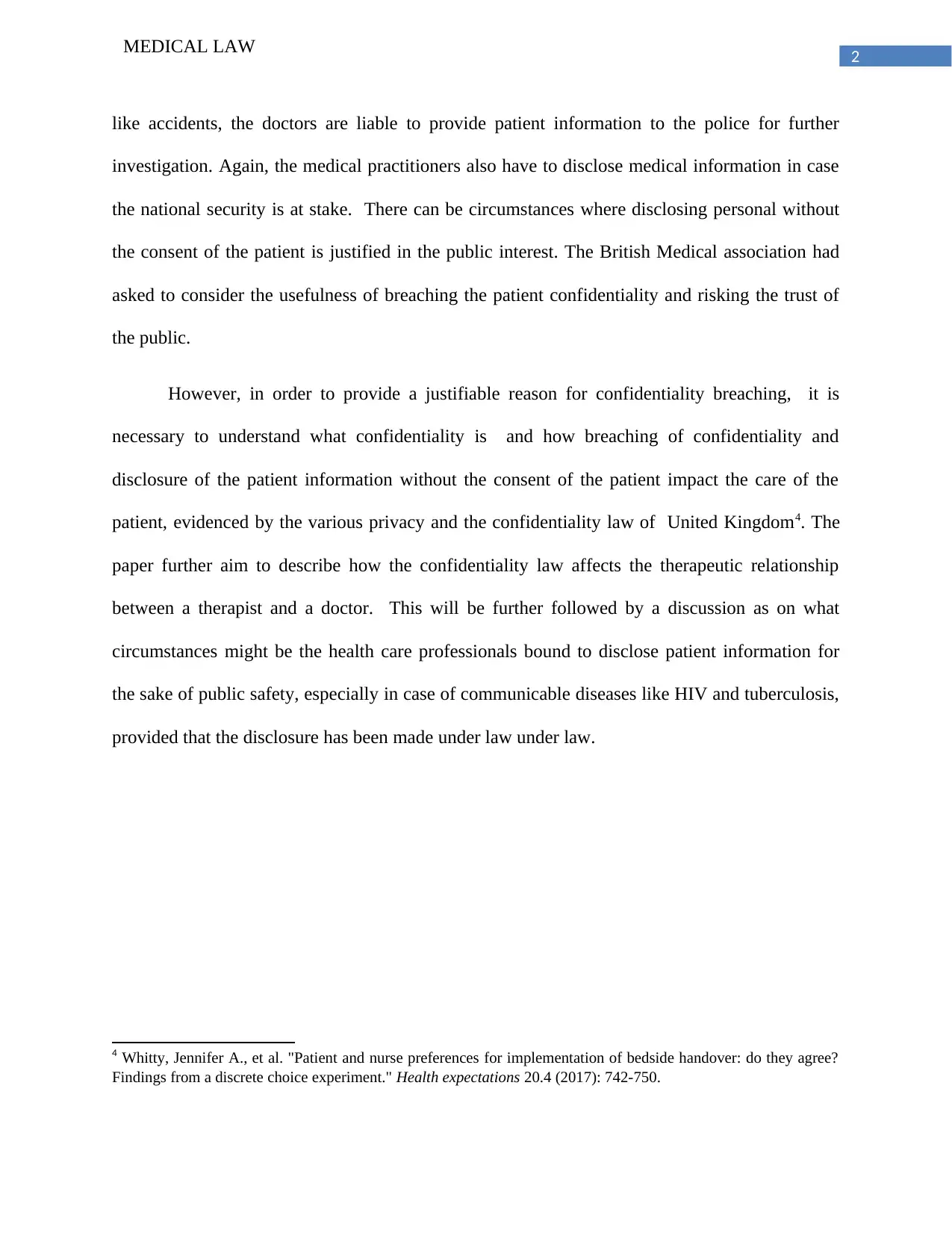
2
MEDICAL LAW
like accidents, the doctors are liable to provide patient information to the police for further
investigation. Again, the medical practitioners also have to disclose medical information in case
the national security is at stake. There can be circumstances where disclosing personal without
the consent of the patient is justified in the public interest. The British Medical association had
asked to consider the usefulness of breaching the patient confidentiality and risking the trust of
the public.
However, in order to provide a justifiable reason for confidentiality breaching, it is
necessary to understand what confidentiality is and how breaching of confidentiality and
disclosure of the patient information without the consent of the patient impact the care of the
patient, evidenced by the various privacy and the confidentiality law of United Kingdom4. The
paper further aim to describe how the confidentiality law affects the therapeutic relationship
between a therapist and a doctor. This will be further followed by a discussion as on what
circumstances might be the health care professionals bound to disclose patient information for
the sake of public safety, especially in case of communicable diseases like HIV and tuberculosis,
provided that the disclosure has been made under law under law.
4 Whitty, Jennifer A., et al. "Patient and nurse preferences for implementation of bedside handover: do they agree?
Findings from a discrete choice experiment." Health expectations 20.4 (2017): 742-750.
MEDICAL LAW
like accidents, the doctors are liable to provide patient information to the police for further
investigation. Again, the medical practitioners also have to disclose medical information in case
the national security is at stake. There can be circumstances where disclosing personal without
the consent of the patient is justified in the public interest. The British Medical association had
asked to consider the usefulness of breaching the patient confidentiality and risking the trust of
the public.
However, in order to provide a justifiable reason for confidentiality breaching, it is
necessary to understand what confidentiality is and how breaching of confidentiality and
disclosure of the patient information without the consent of the patient impact the care of the
patient, evidenced by the various privacy and the confidentiality law of United Kingdom4. The
paper further aim to describe how the confidentiality law affects the therapeutic relationship
between a therapist and a doctor. This will be further followed by a discussion as on what
circumstances might be the health care professionals bound to disclose patient information for
the sake of public safety, especially in case of communicable diseases like HIV and tuberculosis,
provided that the disclosure has been made under law under law.
4 Whitty, Jennifer A., et al. "Patient and nurse preferences for implementation of bedside handover: do they agree?
Findings from a discrete choice experiment." Health expectations 20.4 (2017): 742-750.
⊘ This is a preview!⊘
Do you want full access?
Subscribe today to unlock all pages.

Trusted by 1+ million students worldwide
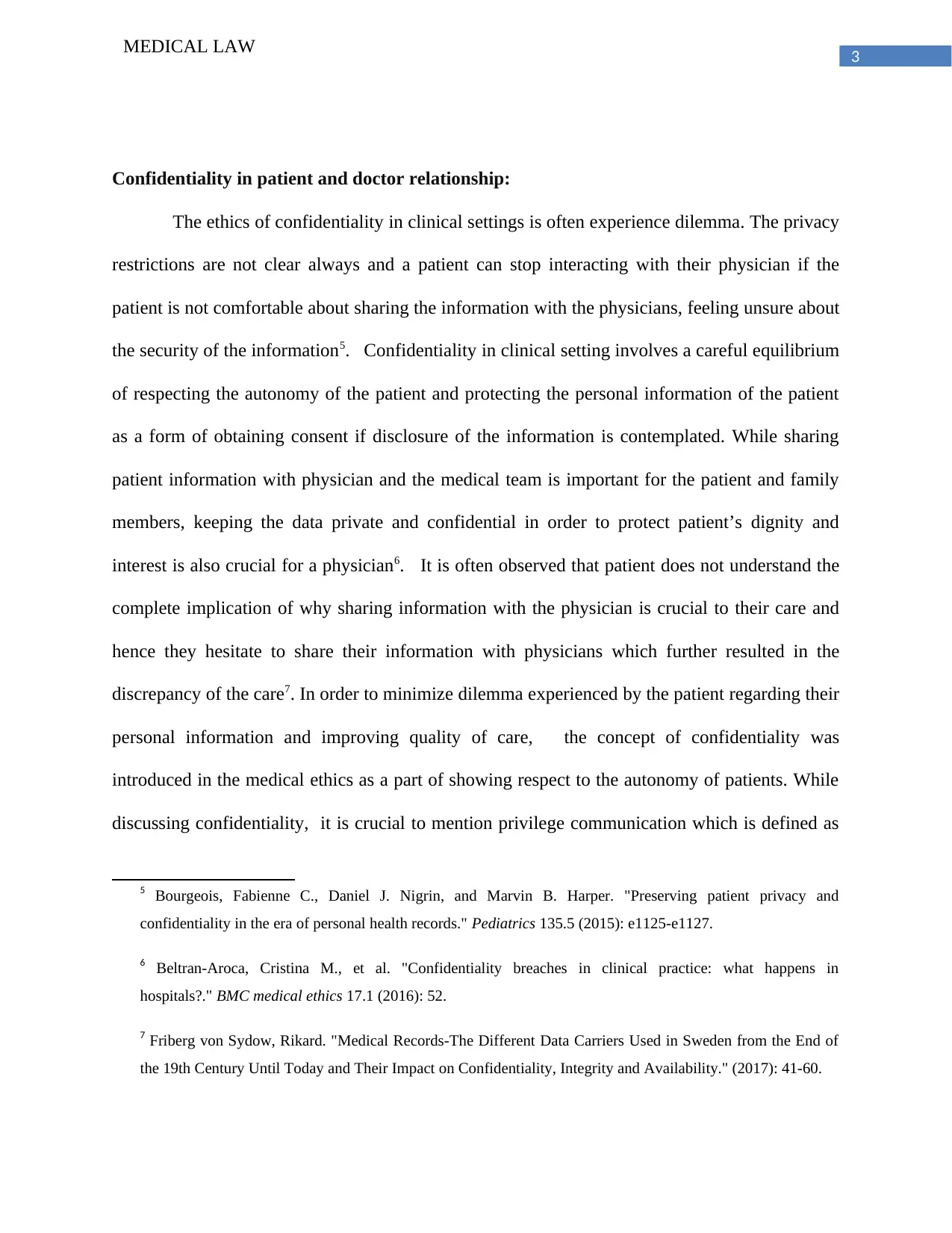
3
MEDICAL LAW
Confidentiality in patient and doctor relationship:
The ethics of confidentiality in clinical settings is often experience dilemma. The privacy
restrictions are not clear always and a patient can stop interacting with their physician if the
patient is not comfortable about sharing the information with the physicians, feeling unsure about
the security of the information5. Confidentiality in clinical setting involves a careful equilibrium
of respecting the autonomy of the patient and protecting the personal information of the patient
as a form of obtaining consent if disclosure of the information is contemplated. While sharing
patient information with physician and the medical team is important for the patient and family
members, keeping the data private and confidential in order to protect patient’s dignity and
interest is also crucial for a physician6. It is often observed that patient does not understand the
complete implication of why sharing information with the physician is crucial to their care and
hence they hesitate to share their information with physicians which further resulted in the
discrepancy of the care7. In order to minimize dilemma experienced by the patient regarding their
personal information and improving quality of care, the concept of confidentiality was
introduced in the medical ethics as a part of showing respect to the autonomy of patients. While
discussing confidentiality, it is crucial to mention privilege communication which is defined as
5 Bourgeois, Fabienne C., Daniel J. Nigrin, and Marvin B. Harper. "Preserving patient privacy and
confidentiality in the era of personal health records." Pediatrics 135.5 (2015): e1125-e1127.
6 Beltran-Aroca, Cristina M., et al. "Confidentiality breaches in clinical practice: what happens in
hospitals?." BMC medical ethics 17.1 (2016): 52.
7 Friberg von Sydow, Rikard. "Medical Records-The Different Data Carriers Used in Sweden from the End of
the 19th Century Until Today and Their Impact on Confidentiality, Integrity and Availability." (2017): 41-60.
MEDICAL LAW
Confidentiality in patient and doctor relationship:
The ethics of confidentiality in clinical settings is often experience dilemma. The privacy
restrictions are not clear always and a patient can stop interacting with their physician if the
patient is not comfortable about sharing the information with the physicians, feeling unsure about
the security of the information5. Confidentiality in clinical setting involves a careful equilibrium
of respecting the autonomy of the patient and protecting the personal information of the patient
as a form of obtaining consent if disclosure of the information is contemplated. While sharing
patient information with physician and the medical team is important for the patient and family
members, keeping the data private and confidential in order to protect patient’s dignity and
interest is also crucial for a physician6. It is often observed that patient does not understand the
complete implication of why sharing information with the physician is crucial to their care and
hence they hesitate to share their information with physicians which further resulted in the
discrepancy of the care7. In order to minimize dilemma experienced by the patient regarding their
personal information and improving quality of care, the concept of confidentiality was
introduced in the medical ethics as a part of showing respect to the autonomy of patients. While
discussing confidentiality, it is crucial to mention privilege communication which is defined as
5 Bourgeois, Fabienne C., Daniel J. Nigrin, and Marvin B. Harper. "Preserving patient privacy and
confidentiality in the era of personal health records." Pediatrics 135.5 (2015): e1125-e1127.
6 Beltran-Aroca, Cristina M., et al. "Confidentiality breaches in clinical practice: what happens in
hospitals?." BMC medical ethics 17.1 (2016): 52.
7 Friberg von Sydow, Rikard. "Medical Records-The Different Data Carriers Used in Sweden from the End of
the 19th Century Until Today and Their Impact on Confidentiality, Integrity and Availability." (2017): 41-60.
Paraphrase This Document
Need a fresh take? Get an instant paraphrase of this document with our AI Paraphraser
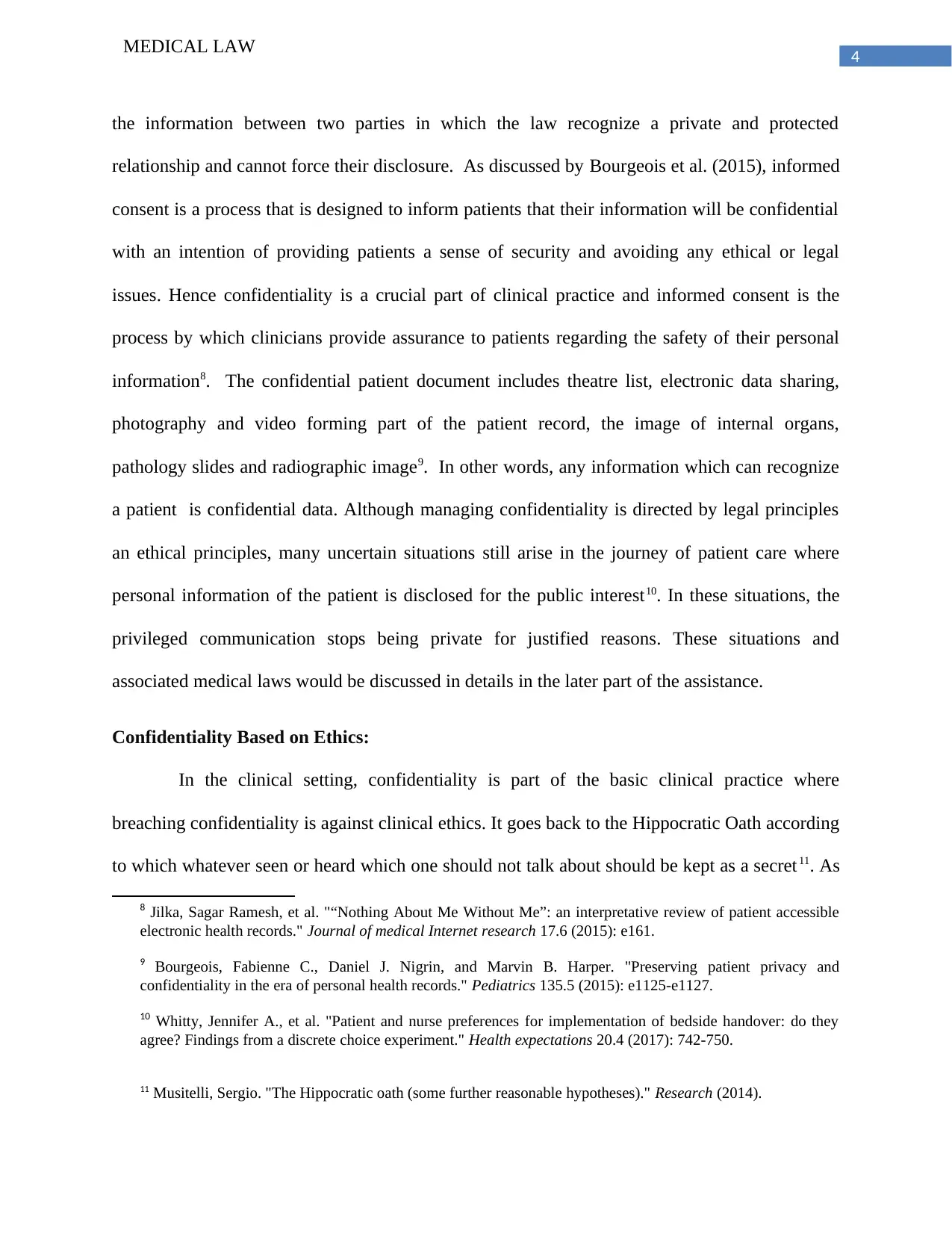
4
MEDICAL LAW
the information between two parties in which the law recognize a private and protected
relationship and cannot force their disclosure. As discussed by Bourgeois et al. (2015), informed
consent is a process that is designed to inform patients that their information will be confidential
with an intention of providing patients a sense of security and avoiding any ethical or legal
issues. Hence confidentiality is a crucial part of clinical practice and informed consent is the
process by which clinicians provide assurance to patients regarding the safety of their personal
information8. The confidential patient document includes theatre list, electronic data sharing,
photography and video forming part of the patient record, the image of internal organs,
pathology slides and radiographic image9. In other words, any information which can recognize
a patient is confidential data. Although managing confidentiality is directed by legal principles
an ethical principles, many uncertain situations still arise in the journey of patient care where
personal information of the patient is disclosed for the public interest10. In these situations, the
privileged communication stops being private for justified reasons. These situations and
associated medical laws would be discussed in details in the later part of the assistance.
Confidentiality Based on Ethics:
In the clinical setting, confidentiality is part of the basic clinical practice where
breaching confidentiality is against clinical ethics. It goes back to the Hippocratic Oath according
to which whatever seen or heard which one should not talk about should be kept as a secret11. As
8 Jilka, Sagar Ramesh, et al. "“Nothing About Me Without Me”: an interpretative review of patient accessible
electronic health records." Journal of medical Internet research 17.6 (2015): e161.
9 Bourgeois, Fabienne C., Daniel J. Nigrin, and Marvin B. Harper. "Preserving patient privacy and
confidentiality in the era of personal health records." Pediatrics 135.5 (2015): e1125-e1127.
10 Whitty, Jennifer A., et al. "Patient and nurse preferences for implementation of bedside handover: do they
agree? Findings from a discrete choice experiment." Health expectations 20.4 (2017): 742-750.
11 Musitelli, Sergio. "The Hippocratic oath (some further reasonable hypotheses)." Research (2014).
MEDICAL LAW
the information between two parties in which the law recognize a private and protected
relationship and cannot force their disclosure. As discussed by Bourgeois et al. (2015), informed
consent is a process that is designed to inform patients that their information will be confidential
with an intention of providing patients a sense of security and avoiding any ethical or legal
issues. Hence confidentiality is a crucial part of clinical practice and informed consent is the
process by which clinicians provide assurance to patients regarding the safety of their personal
information8. The confidential patient document includes theatre list, electronic data sharing,
photography and video forming part of the patient record, the image of internal organs,
pathology slides and radiographic image9. In other words, any information which can recognize
a patient is confidential data. Although managing confidentiality is directed by legal principles
an ethical principles, many uncertain situations still arise in the journey of patient care where
personal information of the patient is disclosed for the public interest10. In these situations, the
privileged communication stops being private for justified reasons. These situations and
associated medical laws would be discussed in details in the later part of the assistance.
Confidentiality Based on Ethics:
In the clinical setting, confidentiality is part of the basic clinical practice where
breaching confidentiality is against clinical ethics. It goes back to the Hippocratic Oath according
to which whatever seen or heard which one should not talk about should be kept as a secret11. As
8 Jilka, Sagar Ramesh, et al. "“Nothing About Me Without Me”: an interpretative review of patient accessible
electronic health records." Journal of medical Internet research 17.6 (2015): e161.
9 Bourgeois, Fabienne C., Daniel J. Nigrin, and Marvin B. Harper. "Preserving patient privacy and
confidentiality in the era of personal health records." Pediatrics 135.5 (2015): e1125-e1127.
10 Whitty, Jennifer A., et al. "Patient and nurse preferences for implementation of bedside handover: do they
agree? Findings from a discrete choice experiment." Health expectations 20.4 (2017): 742-750.
11 Musitelli, Sergio. "The Hippocratic oath (some further reasonable hypotheses)." Research (2014).
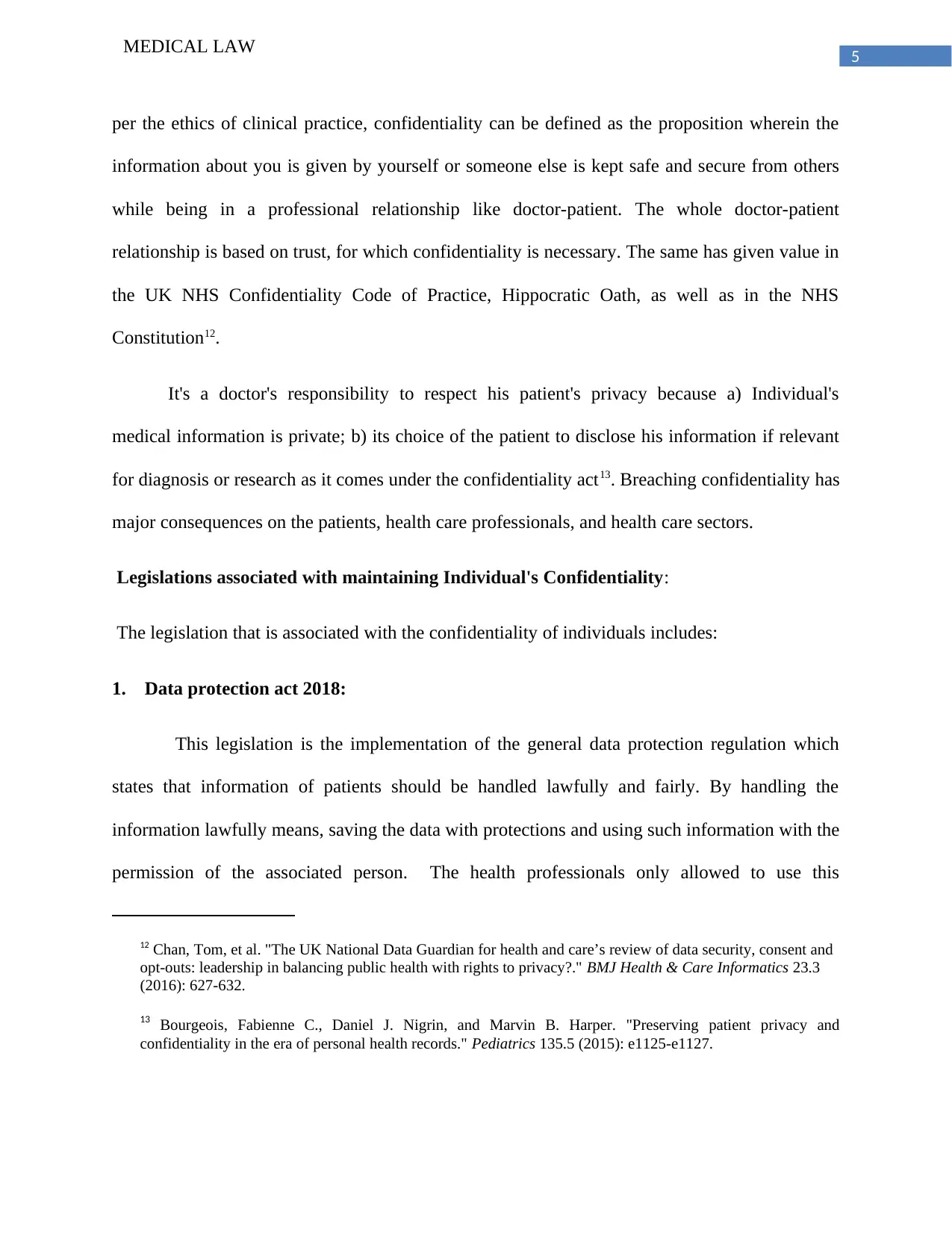
5
MEDICAL LAW
per the ethics of clinical practice, confidentiality can be defined as the proposition wherein the
information about you is given by yourself or someone else is kept safe and secure from others
while being in a professional relationship like doctor-patient. The whole doctor-patient
relationship is based on trust, for which confidentiality is necessary. The same has given value in
the UK NHS Confidentiality Code of Practice, Hippocratic Oath, as well as in the NHS
Constitution12.
It's a doctor's responsibility to respect his patient's privacy because a) Individual's
medical information is private; b) its choice of the patient to disclose his information if relevant
for diagnosis or research as it comes under the confidentiality act13. Breaching confidentiality has
major consequences on the patients, health care professionals, and health care sectors.
Legislations associated with maintaining Individual's Confidentiality:
The legislation that is associated with the confidentiality of individuals includes:
1. Data protection act 2018:
This legislation is the implementation of the general data protection regulation which
states that information of patients should be handled lawfully and fairly. By handling the
information lawfully means, saving the data with protections and using such information with the
permission of the associated person. The health professionals only allowed to use this
12 Chan, Tom, et al. "The UK National Data Guardian for health and care’s review of data security, consent and
opt-outs: leadership in balancing public health with rights to privacy?." BMJ Health & Care Informatics 23.3
(2016): 627-632.
13 Bourgeois, Fabienne C., Daniel J. Nigrin, and Marvin B. Harper. "Preserving patient privacy and
confidentiality in the era of personal health records." Pediatrics 135.5 (2015): e1125-e1127.
MEDICAL LAW
per the ethics of clinical practice, confidentiality can be defined as the proposition wherein the
information about you is given by yourself or someone else is kept safe and secure from others
while being in a professional relationship like doctor-patient. The whole doctor-patient
relationship is based on trust, for which confidentiality is necessary. The same has given value in
the UK NHS Confidentiality Code of Practice, Hippocratic Oath, as well as in the NHS
Constitution12.
It's a doctor's responsibility to respect his patient's privacy because a) Individual's
medical information is private; b) its choice of the patient to disclose his information if relevant
for diagnosis or research as it comes under the confidentiality act13. Breaching confidentiality has
major consequences on the patients, health care professionals, and health care sectors.
Legislations associated with maintaining Individual's Confidentiality:
The legislation that is associated with the confidentiality of individuals includes:
1. Data protection act 2018:
This legislation is the implementation of the general data protection regulation which
states that information of patients should be handled lawfully and fairly. By handling the
information lawfully means, saving the data with protections and using such information with the
permission of the associated person. The health professionals only allowed to use this
12 Chan, Tom, et al. "The UK National Data Guardian for health and care’s review of data security, consent and
opt-outs: leadership in balancing public health with rights to privacy?." BMJ Health & Care Informatics 23.3
(2016): 627-632.
13 Bourgeois, Fabienne C., Daniel J. Nigrin, and Marvin B. Harper. "Preserving patient privacy and
confidentiality in the era of personal health records." Pediatrics 135.5 (2015): e1125-e1127.
⊘ This is a preview!⊘
Do you want full access?
Subscribe today to unlock all pages.

Trusted by 1+ million students worldwide
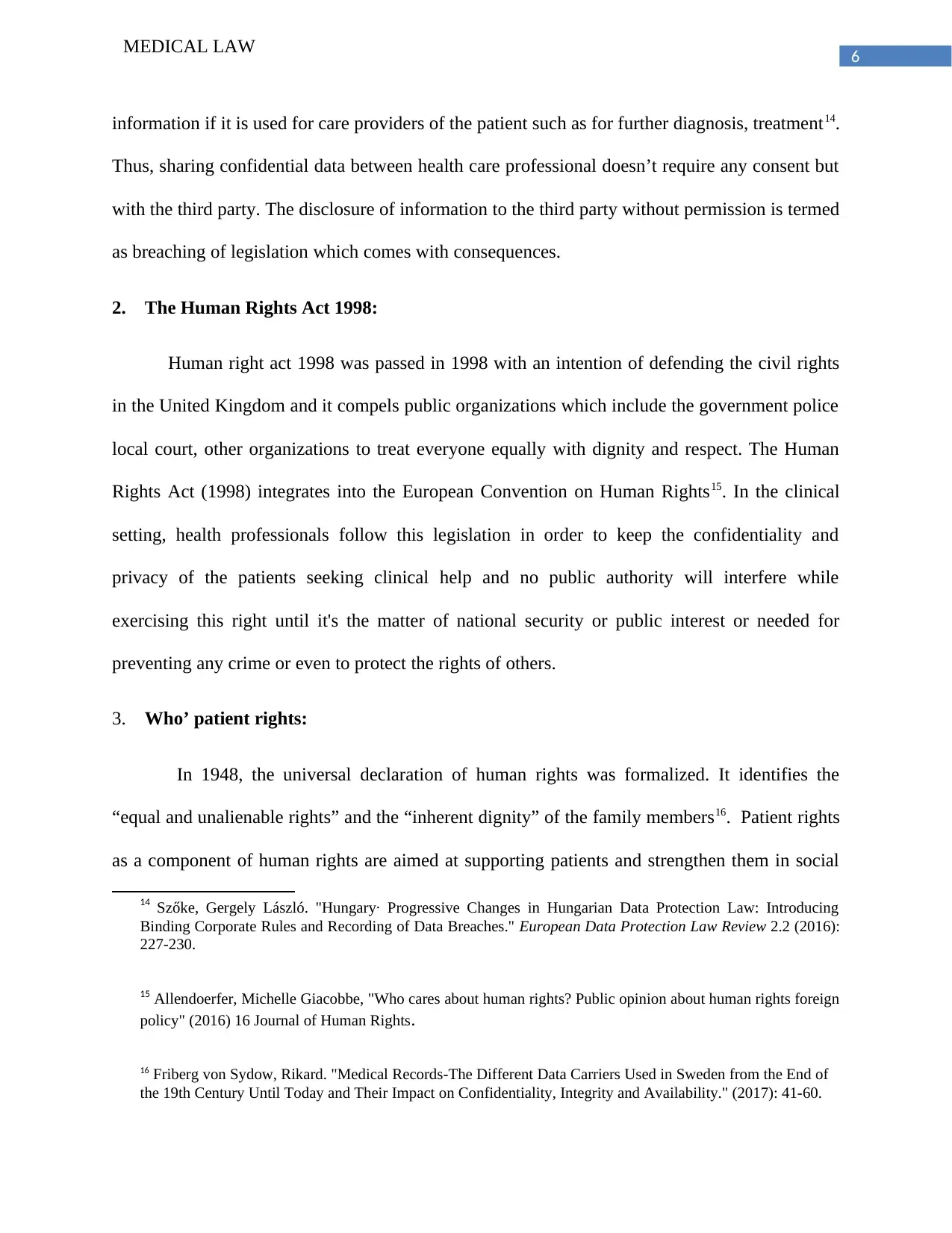
6
MEDICAL LAW
information if it is used for care providers of the patient such as for further diagnosis, treatment14.
Thus, sharing confidential data between health care professional doesn’t require any consent but
with the third party. The disclosure of information to the third party without permission is termed
as breaching of legislation which comes with consequences.
2. The Human Rights Act 1998:
Human right act 1998 was passed in 1998 with an intention of defending the civil rights
in the United Kingdom and it compels public organizations which include the government police
local court, other organizations to treat everyone equally with dignity and respect. The Human
Rights Act (1998) integrates into the European Convention on Human Rights15. In the clinical
setting, health professionals follow this legislation in order to keep the confidentiality and
privacy of the patients seeking clinical help and no public authority will interfere while
exercising this right until it's the matter of national security or public interest or needed for
preventing any crime or even to protect the rights of others.
3. Who’ patient rights:
In 1948, the universal declaration of human rights was formalized. It identifies the
“equal and unalienable rights” and the “inherent dignity” of the family members16. Patient rights
as a component of human rights are aimed at supporting patients and strengthen them in social
14 Szőke, Gergely László. "Hungary∙ Progressive Changes in Hungarian Data Protection Law: Introducing
Binding Corporate Rules and Recording of Data Breaches." European Data Protection Law Review 2.2 (2016):
227-230.
15 Allendoerfer, Michelle Giacobbe, "Who cares about human rights? Public opinion about human rights foreign
policy" (2016) 16 Journal of Human Rights.
16 Friberg von Sydow, Rikard. "Medical Records-The Different Data Carriers Used in Sweden from the End of
the 19th Century Until Today and Their Impact on Confidentiality, Integrity and Availability." (2017): 41-60.
MEDICAL LAW
information if it is used for care providers of the patient such as for further diagnosis, treatment14.
Thus, sharing confidential data between health care professional doesn’t require any consent but
with the third party. The disclosure of information to the third party without permission is termed
as breaching of legislation which comes with consequences.
2. The Human Rights Act 1998:
Human right act 1998 was passed in 1998 with an intention of defending the civil rights
in the United Kingdom and it compels public organizations which include the government police
local court, other organizations to treat everyone equally with dignity and respect. The Human
Rights Act (1998) integrates into the European Convention on Human Rights15. In the clinical
setting, health professionals follow this legislation in order to keep the confidentiality and
privacy of the patients seeking clinical help and no public authority will interfere while
exercising this right until it's the matter of national security or public interest or needed for
preventing any crime or even to protect the rights of others.
3. Who’ patient rights:
In 1948, the universal declaration of human rights was formalized. It identifies the
“equal and unalienable rights” and the “inherent dignity” of the family members16. Patient rights
as a component of human rights are aimed at supporting patients and strengthen them in social
14 Szőke, Gergely László. "Hungary∙ Progressive Changes in Hungarian Data Protection Law: Introducing
Binding Corporate Rules and Recording of Data Breaches." European Data Protection Law Review 2.2 (2016):
227-230.
15 Allendoerfer, Michelle Giacobbe, "Who cares about human rights? Public opinion about human rights foreign
policy" (2016) 16 Journal of Human Rights.
16 Friberg von Sydow, Rikard. "Medical Records-The Different Data Carriers Used in Sweden from the End of
the 19th Century Until Today and Their Impact on Confidentiality, Integrity and Availability." (2017): 41-60.
Paraphrase This Document
Need a fresh take? Get an instant paraphrase of this document with our AI Paraphraser
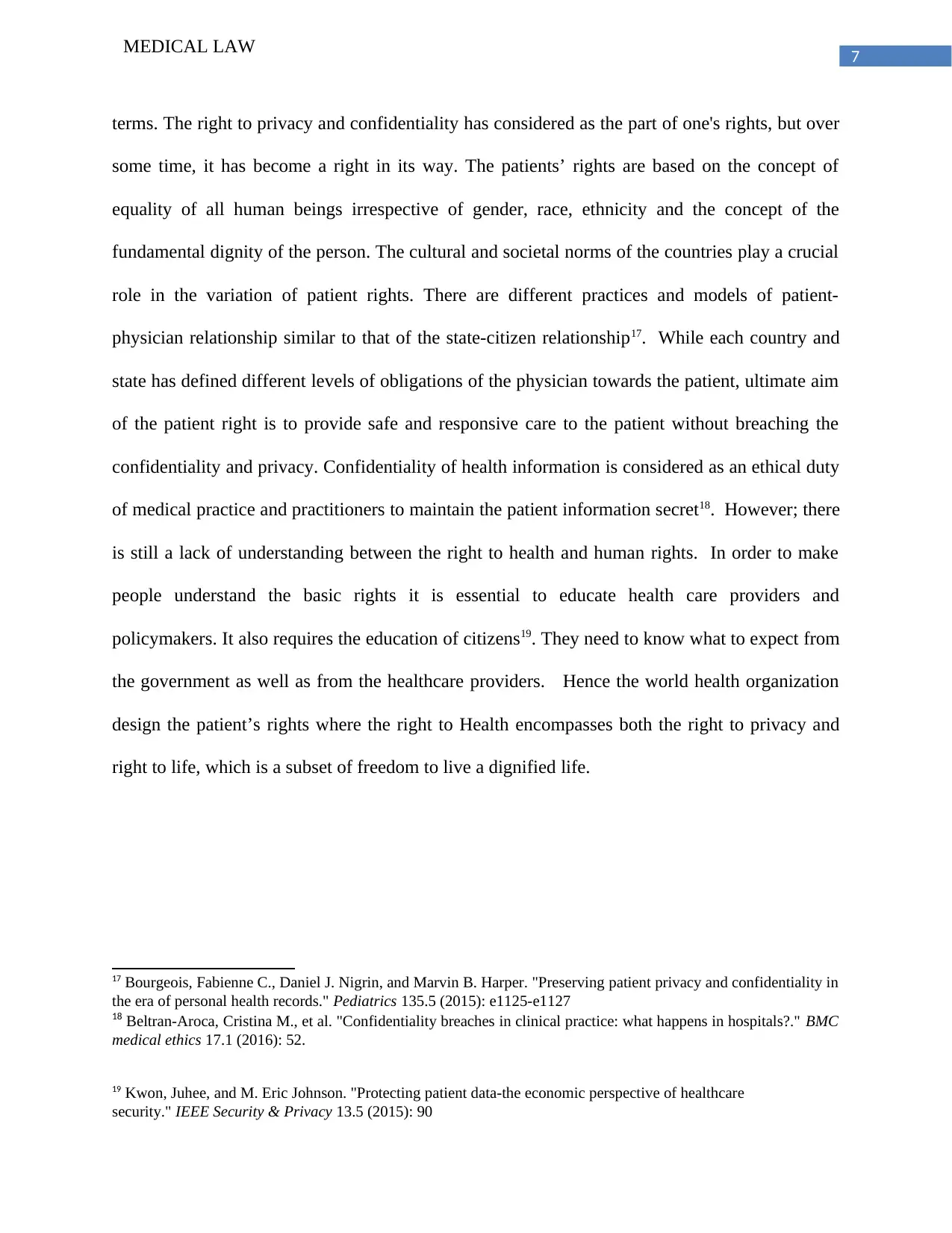
7
MEDICAL LAW
terms. The right to privacy and confidentiality has considered as the part of one's rights, but over
some time, it has become a right in its way. The patients’ rights are based on the concept of
equality of all human beings irrespective of gender, race, ethnicity and the concept of the
fundamental dignity of the person. The cultural and societal norms of the countries play a crucial
role in the variation of patient rights. There are different practices and models of patient-
physician relationship similar to that of the state-citizen relationship17. While each country and
state has defined different levels of obligations of the physician towards the patient, ultimate aim
of the patient right is to provide safe and responsive care to the patient without breaching the
confidentiality and privacy. Confidentiality of health information is considered as an ethical duty
of medical practice and practitioners to maintain the patient information secret18. However; there
is still a lack of understanding between the right to health and human rights. In order to make
people understand the basic rights it is essential to educate health care providers and
policymakers. It also requires the education of citizens19. They need to know what to expect from
the government as well as from the healthcare providers. Hence the world health organization
design the patient’s rights where the right to Health encompasses both the right to privacy and
right to life, which is a subset of freedom to live a dignified life.
17 Bourgeois, Fabienne C., Daniel J. Nigrin, and Marvin B. Harper. "Preserving patient privacy and confidentiality in
the era of personal health records." Pediatrics 135.5 (2015): e1125-e1127
18 Beltran-Aroca, Cristina M., et al. "Confidentiality breaches in clinical practice: what happens in hospitals?." BMC
medical ethics 17.1 (2016): 52.
19 Kwon, Juhee, and M. Eric Johnson. "Protecting patient data-the economic perspective of healthcare
security." IEEE Security & Privacy 13.5 (2015): 90
MEDICAL LAW
terms. The right to privacy and confidentiality has considered as the part of one's rights, but over
some time, it has become a right in its way. The patients’ rights are based on the concept of
equality of all human beings irrespective of gender, race, ethnicity and the concept of the
fundamental dignity of the person. The cultural and societal norms of the countries play a crucial
role in the variation of patient rights. There are different practices and models of patient-
physician relationship similar to that of the state-citizen relationship17. While each country and
state has defined different levels of obligations of the physician towards the patient, ultimate aim
of the patient right is to provide safe and responsive care to the patient without breaching the
confidentiality and privacy. Confidentiality of health information is considered as an ethical duty
of medical practice and practitioners to maintain the patient information secret18. However; there
is still a lack of understanding between the right to health and human rights. In order to make
people understand the basic rights it is essential to educate health care providers and
policymakers. It also requires the education of citizens19. They need to know what to expect from
the government as well as from the healthcare providers. Hence the world health organization
design the patient’s rights where the right to Health encompasses both the right to privacy and
right to life, which is a subset of freedom to live a dignified life.
17 Bourgeois, Fabienne C., Daniel J. Nigrin, and Marvin B. Harper. "Preserving patient privacy and confidentiality in
the era of personal health records." Pediatrics 135.5 (2015): e1125-e1127
18 Beltran-Aroca, Cristina M., et al. "Confidentiality breaches in clinical practice: what happens in hospitals?." BMC
medical ethics 17.1 (2016): 52.
19 Kwon, Juhee, and M. Eric Johnson. "Protecting patient data-the economic perspective of healthcare
security." IEEE Security & Privacy 13.5 (2015): 90
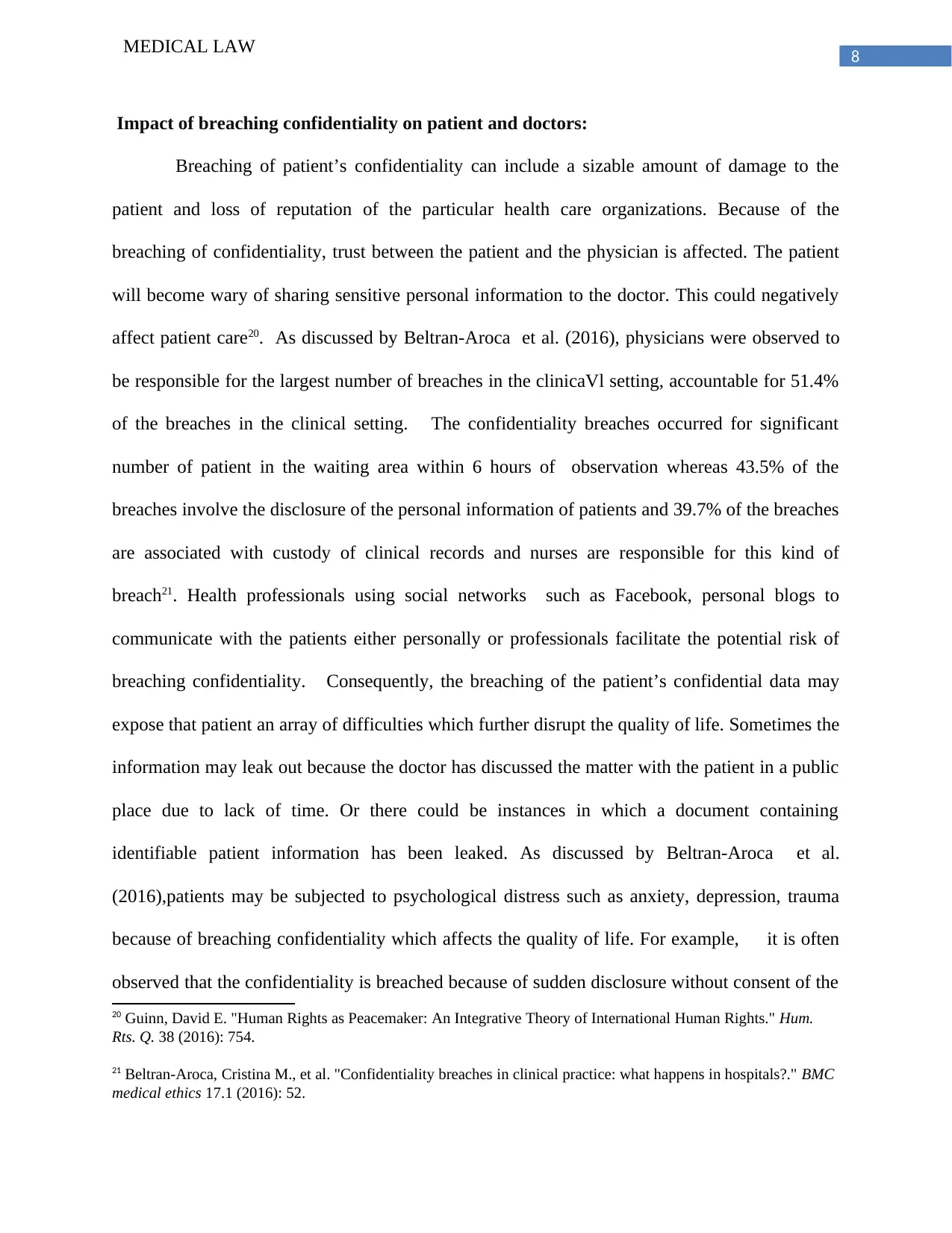
8
MEDICAL LAW
Impact of breaching confidentiality on patient and doctors:
Breaching of patient’s confidentiality can include a sizable amount of damage to the
patient and loss of reputation of the particular health care organizations. Because of the
breaching of confidentiality, trust between the patient and the physician is affected. The patient
will become wary of sharing sensitive personal information to the doctor. This could negatively
affect patient care20. As discussed by Beltran-Aroca et al. (2016), physicians were observed to
be responsible for the largest number of breaches in the clinicaVl setting, accountable for 51.4%
of the breaches in the clinical setting. The confidentiality breaches occurred for significant
number of patient in the waiting area within 6 hours of observation whereas 43.5% of the
breaches involve the disclosure of the personal information of patients and 39.7% of the breaches
are associated with custody of clinical records and nurses are responsible for this kind of
breach21. Health professionals using social networks such as Facebook, personal blogs to
communicate with the patients either personally or professionals facilitate the potential risk of
breaching confidentiality. Consequently, the breaching of the patient’s confidential data may
expose that patient an array of difficulties which further disrupt the quality of life. Sometimes the
information may leak out because the doctor has discussed the matter with the patient in a public
place due to lack of time. Or there could be instances in which a document containing
identifiable patient information has been leaked. As discussed by Beltran-Aroca et al.
(2016),patients may be subjected to psychological distress such as anxiety, depression, trauma
because of breaching confidentiality which affects the quality of life. For example, it is often
observed that the confidentiality is breached because of sudden disclosure without consent of the
20 Guinn, David E. "Human Rights as Peacemaker: An Integrative Theory of International Human Rights." Hum.
Rts. Q. 38 (2016): 754.
21 Beltran-Aroca, Cristina M., et al. "Confidentiality breaches in clinical practice: what happens in hospitals?." BMC
medical ethics 17.1 (2016): 52.
MEDICAL LAW
Impact of breaching confidentiality on patient and doctors:
Breaching of patient’s confidentiality can include a sizable amount of damage to the
patient and loss of reputation of the particular health care organizations. Because of the
breaching of confidentiality, trust between the patient and the physician is affected. The patient
will become wary of sharing sensitive personal information to the doctor. This could negatively
affect patient care20. As discussed by Beltran-Aroca et al. (2016), physicians were observed to
be responsible for the largest number of breaches in the clinicaVl setting, accountable for 51.4%
of the breaches in the clinical setting. The confidentiality breaches occurred for significant
number of patient in the waiting area within 6 hours of observation whereas 43.5% of the
breaches involve the disclosure of the personal information of patients and 39.7% of the breaches
are associated with custody of clinical records and nurses are responsible for this kind of
breach21. Health professionals using social networks such as Facebook, personal blogs to
communicate with the patients either personally or professionals facilitate the potential risk of
breaching confidentiality. Consequently, the breaching of the patient’s confidential data may
expose that patient an array of difficulties which further disrupt the quality of life. Sometimes the
information may leak out because the doctor has discussed the matter with the patient in a public
place due to lack of time. Or there could be instances in which a document containing
identifiable patient information has been leaked. As discussed by Beltran-Aroca et al.
(2016),patients may be subjected to psychological distress such as anxiety, depression, trauma
because of breaching confidentiality which affects the quality of life. For example, it is often
observed that the confidentiality is breached because of sudden disclosure without consent of the
20 Guinn, David E. "Human Rights as Peacemaker: An Integrative Theory of International Human Rights." Hum.
Rts. Q. 38 (2016): 754.
21 Beltran-Aroca, Cristina M., et al. "Confidentiality breaches in clinical practice: what happens in hospitals?." BMC
medical ethics 17.1 (2016): 52.
⊘ This is a preview!⊘
Do you want full access?
Subscribe today to unlock all pages.

Trusted by 1+ million students worldwide
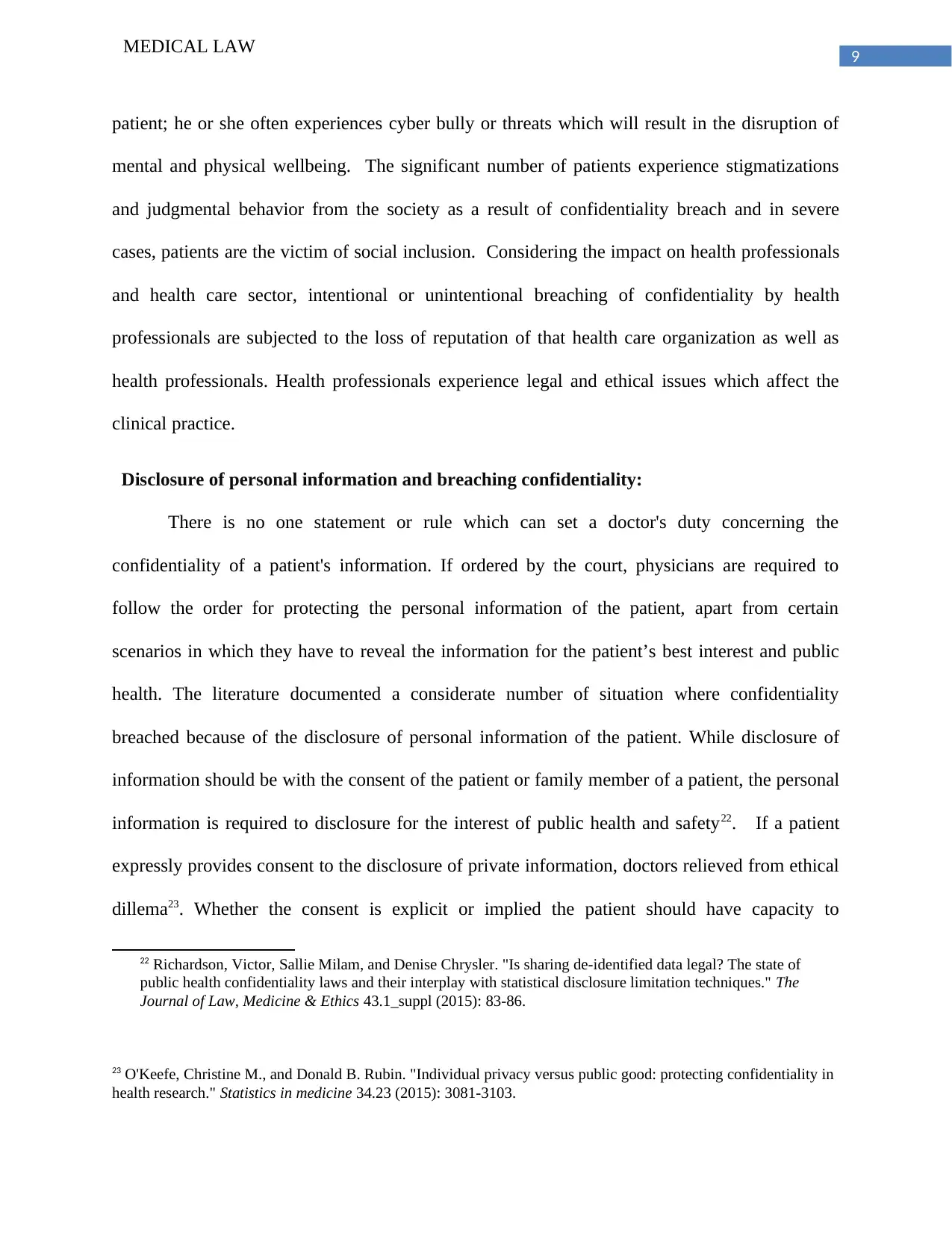
9
MEDICAL LAW
patient; he or she often experiences cyber bully or threats which will result in the disruption of
mental and physical wellbeing. The significant number of patients experience stigmatizations
and judgmental behavior from the society as a result of confidentiality breach and in severe
cases, patients are the victim of social inclusion. Considering the impact on health professionals
and health care sector, intentional or unintentional breaching of confidentiality by health
professionals are subjected to the loss of reputation of that health care organization as well as
health professionals. Health professionals experience legal and ethical issues which affect the
clinical practice.
Disclosure of personal information and breaching confidentiality:
There is no one statement or rule which can set a doctor's duty concerning the
confidentiality of a patient's information. If ordered by the court, physicians are required to
follow the order for protecting the personal information of the patient, apart from certain
scenarios in which they have to reveal the information for the patient’s best interest and public
health. The literature documented a considerate number of situation where confidentiality
breached because of the disclosure of personal information of the patient. While disclosure of
information should be with the consent of the patient or family member of a patient, the personal
information is required to disclosure for the interest of public health and safety22. If a patient
expressly provides consent to the disclosure of private information, doctors relieved from ethical
dillema23. Whether the consent is explicit or implied the patient should have capacity to
22 Richardson, Victor, Sallie Milam, and Denise Chrysler. "Is sharing de-identified data legal? The state of
public health confidentiality laws and their interplay with statistical disclosure limitation techniques." The
Journal of Law, Medicine & Ethics 43.1_suppl (2015): 83-86.
23 O'Keefe, Christine M., and Donald B. Rubin. "Individual privacy versus public good: protecting confidentiality in
health research." Statistics in medicine 34.23 (2015): 3081-3103.
MEDICAL LAW
patient; he or she often experiences cyber bully or threats which will result in the disruption of
mental and physical wellbeing. The significant number of patients experience stigmatizations
and judgmental behavior from the society as a result of confidentiality breach and in severe
cases, patients are the victim of social inclusion. Considering the impact on health professionals
and health care sector, intentional or unintentional breaching of confidentiality by health
professionals are subjected to the loss of reputation of that health care organization as well as
health professionals. Health professionals experience legal and ethical issues which affect the
clinical practice.
Disclosure of personal information and breaching confidentiality:
There is no one statement or rule which can set a doctor's duty concerning the
confidentiality of a patient's information. If ordered by the court, physicians are required to
follow the order for protecting the personal information of the patient, apart from certain
scenarios in which they have to reveal the information for the patient’s best interest and public
health. The literature documented a considerate number of situation where confidentiality
breached because of the disclosure of personal information of the patient. While disclosure of
information should be with the consent of the patient or family member of a patient, the personal
information is required to disclosure for the interest of public health and safety22. If a patient
expressly provides consent to the disclosure of private information, doctors relieved from ethical
dillema23. Whether the consent is explicit or implied the patient should have capacity to
22 Richardson, Victor, Sallie Milam, and Denise Chrysler. "Is sharing de-identified data legal? The state of
public health confidentiality laws and their interplay with statistical disclosure limitation techniques." The
Journal of Law, Medicine & Ethics 43.1_suppl (2015): 83-86.
23 O'Keefe, Christine M., and Donald B. Rubin. "Individual privacy versus public good: protecting confidentiality in
health research." Statistics in medicine 34.23 (2015): 3081-3103.
Paraphrase This Document
Need a fresh take? Get an instant paraphrase of this document with our AI Paraphraser
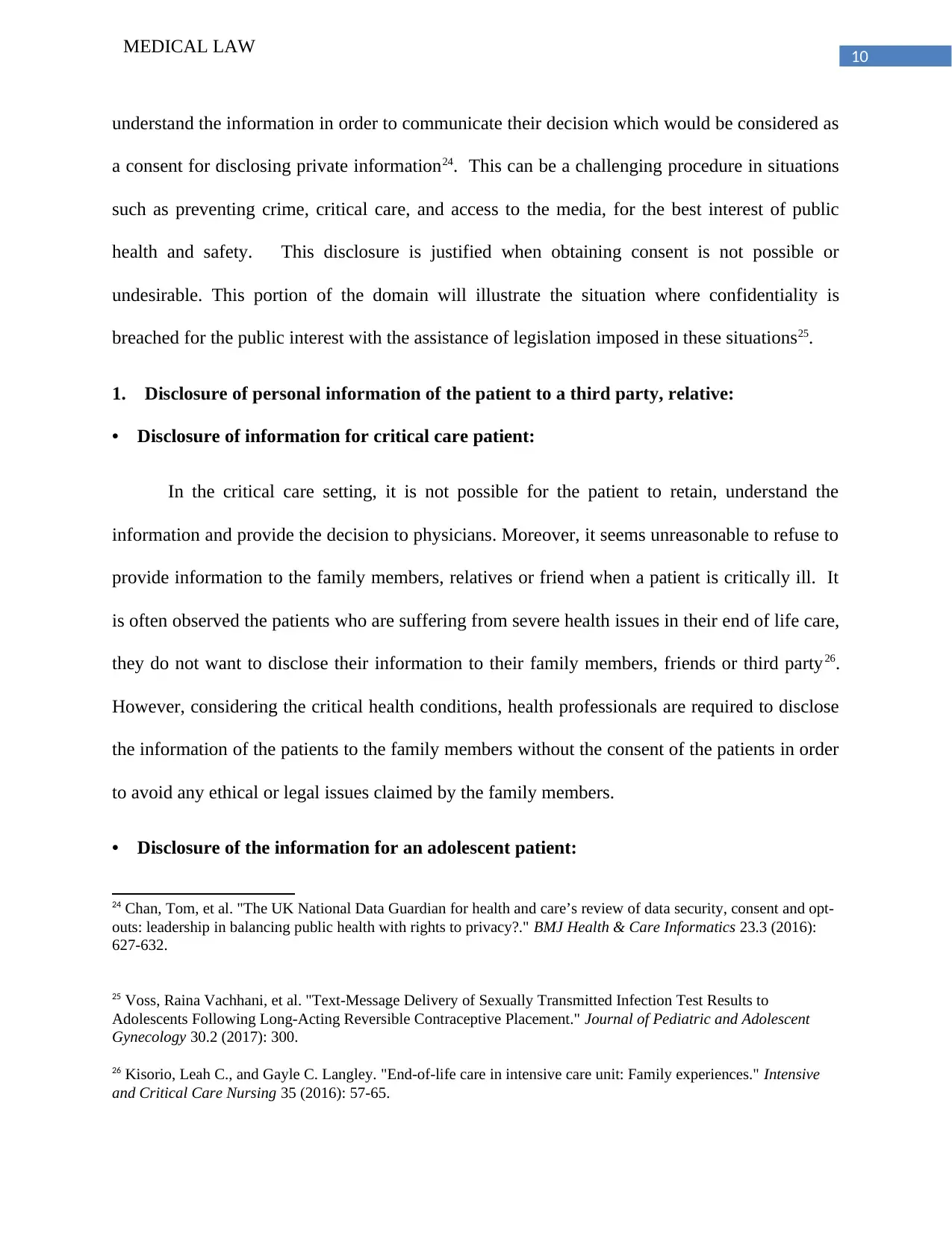
10
MEDICAL LAW
understand the information in order to communicate their decision which would be considered as
a consent for disclosing private information24. This can be a challenging procedure in situations
such as preventing crime, critical care, and access to the media, for the best interest of public
health and safety. This disclosure is justified when obtaining consent is not possible or
undesirable. This portion of the domain will illustrate the situation where confidentiality is
breached for the public interest with the assistance of legislation imposed in these situations25.
1. Disclosure of personal information of the patient to a third party, relative:
• Disclosure of information for critical care patient:
In the critical care setting, it is not possible for the patient to retain, understand the
information and provide the decision to physicians. Moreover, it seems unreasonable to refuse to
provide information to the family members, relatives or friend when a patient is critically ill. It
is often observed the patients who are suffering from severe health issues in their end of life care,
they do not want to disclose their information to their family members, friends or third party26.
However, considering the critical health conditions, health professionals are required to disclose
the information of the patients to the family members without the consent of the patients in order
to avoid any ethical or legal issues claimed by the family members.
• Disclosure of the information for an adolescent patient:
24 Chan, Tom, et al. "The UK National Data Guardian for health and care’s review of data security, consent and opt-
outs: leadership in balancing public health with rights to privacy?." BMJ Health & Care Informatics 23.3 (2016):
627-632.
25 Voss, Raina Vachhani, et al. "Text-Message Delivery of Sexually Transmitted Infection Test Results to
Adolescents Following Long-Acting Reversible Contraceptive Placement." Journal of Pediatric and Adolescent
Gynecology 30.2 (2017): 300.
26 Kisorio, Leah C., and Gayle C. Langley. "End-of-life care in intensive care unit: Family experiences." Intensive
and Critical Care Nursing 35 (2016): 57-65.
MEDICAL LAW
understand the information in order to communicate their decision which would be considered as
a consent for disclosing private information24. This can be a challenging procedure in situations
such as preventing crime, critical care, and access to the media, for the best interest of public
health and safety. This disclosure is justified when obtaining consent is not possible or
undesirable. This portion of the domain will illustrate the situation where confidentiality is
breached for the public interest with the assistance of legislation imposed in these situations25.
1. Disclosure of personal information of the patient to a third party, relative:
• Disclosure of information for critical care patient:
In the critical care setting, it is not possible for the patient to retain, understand the
information and provide the decision to physicians. Moreover, it seems unreasonable to refuse to
provide information to the family members, relatives or friend when a patient is critically ill. It
is often observed the patients who are suffering from severe health issues in their end of life care,
they do not want to disclose their information to their family members, friends or third party26.
However, considering the critical health conditions, health professionals are required to disclose
the information of the patients to the family members without the consent of the patients in order
to avoid any ethical or legal issues claimed by the family members.
• Disclosure of the information for an adolescent patient:
24 Chan, Tom, et al. "The UK National Data Guardian for health and care’s review of data security, consent and opt-
outs: leadership in balancing public health with rights to privacy?." BMJ Health & Care Informatics 23.3 (2016):
627-632.
25 Voss, Raina Vachhani, et al. "Text-Message Delivery of Sexually Transmitted Infection Test Results to
Adolescents Following Long-Acting Reversible Contraceptive Placement." Journal of Pediatric and Adolescent
Gynecology 30.2 (2017): 300.
26 Kisorio, Leah C., and Gayle C. Langley. "End-of-life care in intensive care unit: Family experiences." Intensive
and Critical Care Nursing 35 (2016): 57-65.
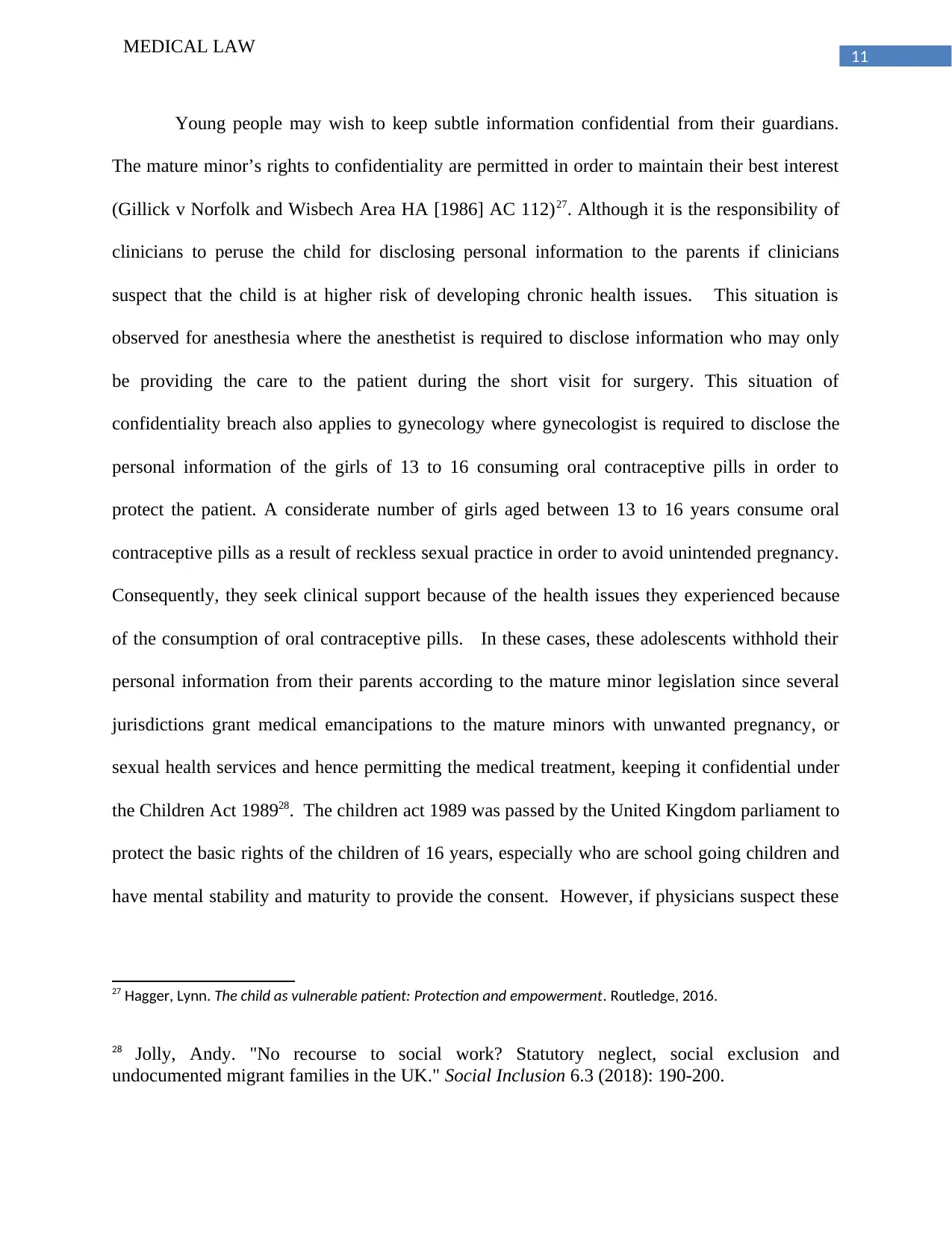
11
MEDICAL LAW
Young people may wish to keep subtle information confidential from their guardians.
The mature minor’s rights to confidentiality are permitted in order to maintain their best interest
(Gillick v Norfolk and Wisbech Area HA [1986] AC 112)27. Although it is the responsibility of
clinicians to peruse the child for disclosing personal information to the parents if clinicians
suspect that the child is at higher risk of developing chronic health issues. This situation is
observed for anesthesia where the anesthetist is required to disclose information who may only
be providing the care to the patient during the short visit for surgery. This situation of
confidentiality breach also applies to gynecology where gynecologist is required to disclose the
personal information of the girls of 13 to 16 consuming oral contraceptive pills in order to
protect the patient. A considerate number of girls aged between 13 to 16 years consume oral
contraceptive pills as a result of reckless sexual practice in order to avoid unintended pregnancy.
Consequently, they seek clinical support because of the health issues they experienced because
of the consumption of oral contraceptive pills. In these cases, these adolescents withhold their
personal information from their parents according to the mature minor legislation since several
jurisdictions grant medical emancipations to the mature minors with unwanted pregnancy, or
sexual health services and hence permitting the medical treatment, keeping it confidential under
the Children Act 198928. The children act 1989 was passed by the United Kingdom parliament to
protect the basic rights of the children of 16 years, especially who are school going children and
have mental stability and maturity to provide the consent. However, if physicians suspect these
27 Hagger, Lynn. The child as vulnerable patient: Protection and empowerment. Routledge, 2016.
28 Jolly, Andy. "No recourse to social work? Statutory neglect, social exclusion and
undocumented migrant families in the UK." Social Inclusion 6.3 (2018): 190-200.
MEDICAL LAW
Young people may wish to keep subtle information confidential from their guardians.
The mature minor’s rights to confidentiality are permitted in order to maintain their best interest
(Gillick v Norfolk and Wisbech Area HA [1986] AC 112)27. Although it is the responsibility of
clinicians to peruse the child for disclosing personal information to the parents if clinicians
suspect that the child is at higher risk of developing chronic health issues. This situation is
observed for anesthesia where the anesthetist is required to disclose information who may only
be providing the care to the patient during the short visit for surgery. This situation of
confidentiality breach also applies to gynecology where gynecologist is required to disclose the
personal information of the girls of 13 to 16 consuming oral contraceptive pills in order to
protect the patient. A considerate number of girls aged between 13 to 16 years consume oral
contraceptive pills as a result of reckless sexual practice in order to avoid unintended pregnancy.
Consequently, they seek clinical support because of the health issues they experienced because
of the consumption of oral contraceptive pills. In these cases, these adolescents withhold their
personal information from their parents according to the mature minor legislation since several
jurisdictions grant medical emancipations to the mature minors with unwanted pregnancy, or
sexual health services and hence permitting the medical treatment, keeping it confidential under
the Children Act 198928. The children act 1989 was passed by the United Kingdom parliament to
protect the basic rights of the children of 16 years, especially who are school going children and
have mental stability and maturity to provide the consent. However, if physicians suspect these
27 Hagger, Lynn. The child as vulnerable patient: Protection and empowerment. Routledge, 2016.
28 Jolly, Andy. "No recourse to social work? Statutory neglect, social exclusion and
undocumented migrant families in the UK." Social Inclusion 6.3 (2018): 190-200.
⊘ This is a preview!⊘
Do you want full access?
Subscribe today to unlock all pages.

Trusted by 1+ million students worldwide
1 out of 28
Related Documents
Your All-in-One AI-Powered Toolkit for Academic Success.
+13062052269
info@desklib.com
Available 24*7 on WhatsApp / Email
![[object Object]](/_next/static/media/star-bottom.7253800d.svg)
Unlock your academic potential
Copyright © 2020–2025 A2Z Services. All Rights Reserved. Developed and managed by ZUCOL.





